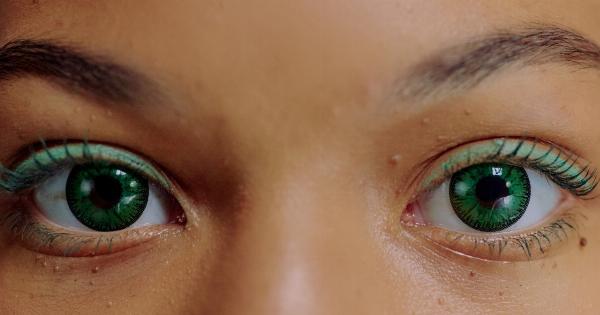Our eyes are one of our most precious senses, allowing us to perceive the world around us in all its beauty. However, they are also susceptible to various conditions and discomfort.
Eye discomfort can range from temporary irritation to severe pain, and it can significantly impact our daily lives. In this article, we will explore the top triggers of eye discomfort and provide practical tips on how to prevent them.
1. Digital Eye Strain
In today’s digital age, many of us spend countless hours staring at screens, whether it’s on our computers, smartphones, or tablets.
Prolonged screen time can result in digital eye strain, characterized by symptoms like eye fatigue, dryness, blurred vision, and headaches.
To prevent digital eye strain:.
- Take regular breaks and look away from the screen every 20 minutes.
- Adjust the display settings on your devices to minimize eye strain.
- Use the 20-20-20 rule: Every 20 minutes, look at something 20 feet away for 20 seconds.
- Consider using blue light filters or glasses to reduce the impact of digital screens.
2. Allergies
Allergies can wreak havoc on our eyes, causing itching, redness, watery eyes, and swelling. Common allergens include pollen, pet dander, dust mites, and mold.
To prevent eye discomfort from allergies:.
- Keep windows closed during high pollen seasons and use air purifiers to filter the air.
- Avoid rubbing your eyes, as it can worsen the irritation.
- Wash your hands frequently to reduce the transfer of allergens to your eyes.
- Consider using over-the-counter antihistamine eye drops to alleviate symptoms.
3. Dry Eyes
Dry eyes occur when the eyes do not produce enough tears or the tears evaporate too quickly. This condition can cause a gritty sensation, burning, redness, and blurred vision.
To prevent dry eyes:.
- Use a humidifier to add moisture to the air.
- Avoid environments with excessive air conditioning or heating.
- Take regular breaks when performing tasks that require intense visual concentration, such as reading or using a computer.
- Blink frequently to keep the eyes lubricated.
- Consider using artificial tears or lubricating eye drops to relieve dryness.
4. Contact Lenses
While contact lenses offer a convenient way to correct vision, improper use or lack of adequate hygiene can cause eye discomfort and even infections.
To prevent contact lens-related eye discomfort:.
- Follow the instructions provided by your eye care professional for wearing and caring for your lenses.
- Replace your lenses as recommended and avoid wearing them for longer than advised.
- Clean and disinfect your lenses properly using the recommended solution.
- Avoid swimming or showering with your lenses on to reduce the risk of infections.
- Give your eyes a break from contact lenses by wearing eyeglasses periodically.
5. Eye Strain from Reading
Reading is an essential activity, but prolonged reading sessions can strain our eyes and lead to discomfort.
To prevent eye strain from reading:.
- Ensure proper lighting when reading, avoiding excessively bright or dim lighting conditions.
- Take regular breaks during long reading sessions and focus on distant objects to relax your eyes.
- Use proper reading glasses or consult an eye care professional for vision correction.
- Hold reading material at a comfortable distance to reduce eye strain.
6. Excessive Sun Exposure
Exposing our eyes to excessive sunlight can lead to a condition called photokeratitis or sunburn of the eyes. It can cause redness, tearing, sensitivity to light, and a gritty feeling.
To prevent eye discomfort from excessive sun exposure:.
- Wear sunglasses with UV protection when spending time outdoors, even on cloudy days.
- Choose sunglasses that wrap around and provide optimal coverage for your eyes.
- Wear a wide-brimmed hat to further shield your eyes from the sun.
7. Poor Contact Lens Hygiene
If you wear contact lenses, maintaining proper hygiene is crucial to prevent eye discomfort and infections.
To ensure good contact lens hygiene:.
- Wash your hands thoroughly before inserting or removing your contact lenses.
- Clean your lenses with the recommended solution and replace it regularly.
- Store your lenses in a clean case and replace the case every few months.
- Avoid sleeping or swimming with your lenses on, unless they are specifically designed for extended wear.
- Regularly visit your eye care professional for check-ups and to ensure proper lens fit.
8. Smoking
Smoking not only harms your overall health but can also lead to various eye conditions and discomfort.
To prevent eye discomfort caused by smoking:.
- Quit smoking or avoid exposure to secondhand smoke.
- Protect yourself from environmental pollutants that can irritate your eyes.
9. Untreated Vision Problems
Untreated vision problems, such as nearsightedness, farsightedness, or astigmatism, can cause eye strain, headaches, and overall eye discomfort.
To prevent eye discomfort from untreated vision problems:.
- Schedule regular eye exams to detect and correct any vision issues.
- Wear appropriate eyeglasses or contact lenses prescribed by your eye care professional.
- Consider vision correction procedures such as LASIK if recommended by your eye care professional.
10. Poor Nutrition
Nutrition plays a vital role in maintaining healthy eyes. Deficiencies in certain nutrients can lead to eye discomfort and vision problems.
To prevent eye discomfort caused by poor nutrition:.
- Incorporate foods rich in omega-3 fatty acids, vitamin C, vitamin E, and zinc into your diet.
- Include dark leafy greens, citrus fruits, nuts, and fish in your meals.
- Stay hydrated by drinking an adequate amount of water.
By understanding the top triggers of eye discomfort and taking proactive measures to prevent them, you can ensure the well-being of your eyes and maintain clear vision.
Remember to consult with an eye care professional if you experience persistent or severe eye discomfort.






























